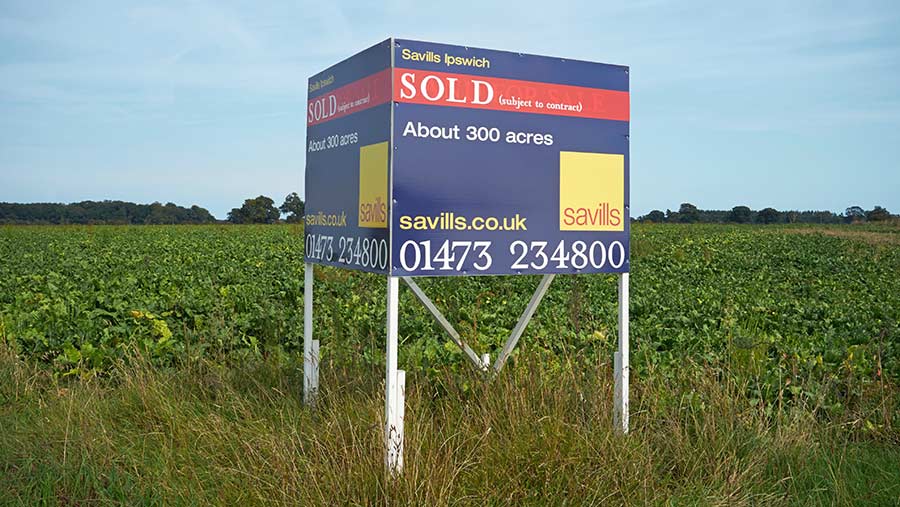So you want to… sell your farm?
 © Clynt Garnham Business/Alamy Stock Photo
© Clynt Garnham Business/Alamy Stock Photo Selling a farm may be the first time in generations that it has changed hands and it can be a complicated process.
Farmers Weekly finds out more about how to maximise the value of this asset and achieve a smooth sale.
How do I get started?
Anyone thinking about the possible sale of their farm should first define their objectives, advises Savills director Andrew Black. Ideally, write down a list of priorities, as well as a proposed timescale.
Consider whether you want to sell the farm as a whole or split it into lots, possibly retaining the house and/or a parcel of land.
See also: What farmers considering land development need to know
What about timing?
It usually takes six to 12 months to sell a farm. May to mid-July is the time when most properties come on to the market.
If you have pedigree livestock that also need to be sold, consideration should be given to the seasonal nature of breeding stock sales.
If emigration is the reason for the sale, the length of time it takes to obtain a visa should not be underestimated.
Should I look into development to increase the farm’s value?
Obtaining planning permission to develop a farm building can greatly increase sale profits. This can be particularly important in cases involving a partnership split, where there might be a requirement to raise a specified sum of money.
Planning permission costs will vary depending on the size, complexity and nature of the development.
However, Mr Black warns that though a barn with development potential might be worth hundreds of thousands of pounds, the finished building could reduce the value of the rest of the farm, especially if it is close to the main house.
“Traditionally, farm buyers are looking for land within a ring fence, with privacy being one of their key requirements,” he says.
How can I ensure I don’t miss out on future development opportunities?
One option is to retain a plot with development potential, such as a field or building within a village boundary, but the owner must take into account whether this will affect the farm’s overall value.
Vendors could also consider attaching a clawback or overage clause to the farm sale. This entitles the seller to a percentage of any future development value within a set period of time. Typically, such agreements run for 20-30 years, retaining 30-50% of the uplift in values.
However, this can put off buyers and such agreements generally take time to negotiate and increase legal costs, says Mr Black.
Should I sell my current property before putting in a bid on other land?
In periods of uncertainty and where competitive bidding has been generated, most vendors are likely to accept cash offers to speed up the sales process and reduce risk, says Mr Black.
With supply remaining tight, the market is still dominated by cash buyers, and this is likely to continue.
There is a risk, especially in a rising market, of selling and then not being able to find a replacement farm, together with the practical implications of storing machinery and having land or housing for livestock.
What are the tax implications?
There is potential liability to capital gains tax, as well as implications for inheritance tax. It is best to seek an accountant’s advice at an early stage, as every farm situation will be different.
The sale of part of the farm is likely to lead to potential capital gains tax liability, whereas the sale of the whole of the farm raises the possibility of qualifying for entrepreneurs’ relief to substantially reduce some of the potential tax liability.
How do I select an agent?
The lack of available land has forced many prospective buyers to widen their search for farm properties. If you choose a local firm, find out which geographical area they plan to target for marketing purposes. There is a national market, even for small farms.
Most agents have websites that allow people to access details and photographs of the properties on offer. Agents’ websites can also be used to find the companies with a portfolio of properties that are most similar to the farm you intend to sell.
Ask agents to explain how they arrived at their valuation and lotting recommendations. These should be backed up by evidence of sales in the area and knowledge of buyers in the market. Steer clear of firms if you suspect they have overvalued your property to secure your custom.
How much are agents’ fees?
Agents normally charge 1.5-2% of the sale price, depending on scale, value and complexity of the sale.
Marketing costs are extra – typically £2,000-£5,000 for an average farm – and should be agreed at the outset.
Which method of sale should I choose?
Vendors have multiple options:
Auction
An auction can be effective, especially if the market is strong and a quick sale is needed, and it is the most transparent process. These can take place in person or online. But a property that fails to meet the reserve might be difficult to sell afterwards.
Private treaty
Private treaty is the most common option, offering the vendor the greatest flexibility and control over the sale.
The deal can be closed by negotiation or best offer, depending on the level of competition.
Formal tender
Formal tender is rarely used, as it tends to be less attractive to potential buyers. Interested parties send the agent their best offer, together with a cheque amounting to a 10% deposit, which is cashed if the bid is accepted.
Off-market sale
Private sales are popular at the moment. This involves offering a farm for sale without any advertising, usually to a known book of interested parties, in order to maintain confidentiality.
